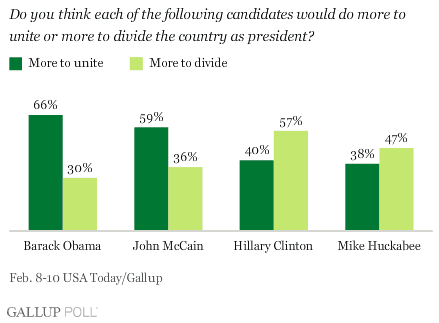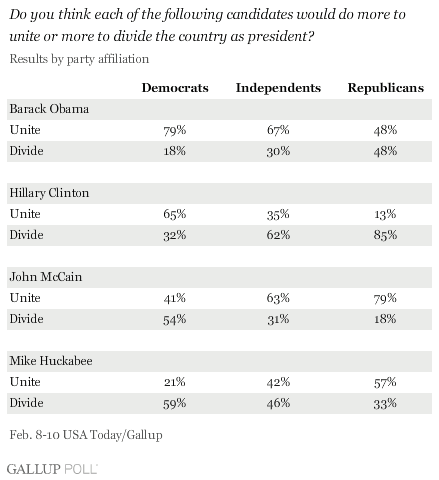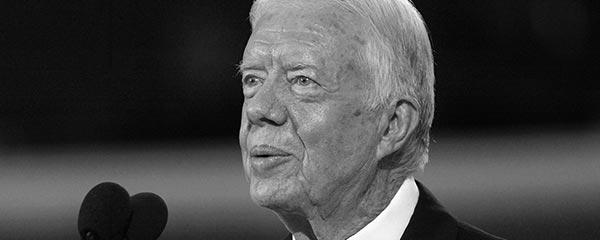PRINCETON, NJ -- Most Americans think Barack Obama and John McCain would unite rather than divide the country as president, but view Hillary Clinton as a potentially more divisive chief executive.

These results are based on a Feb. 8-10 USA Today/������ poll, which asked Americans if they think the four leading presidential candidates "would do more to unite or more to divide the country as president."
The public is most likely to view Obama as a unifying force, with 66% believing he would do more to unite the country and 30% saying he would do more to divide it if he were elected. McCain is a close second, with Americans viewing him as a more of a "uniter" rather than a "divider" by a 59% to 36% margin.
On the other hand, Americans believe Clinton and Mike Huckabee are more likely to divide Americans than bring them together. Forty percent say Clinton would unite Americans as president, but the majority, 57%, say she would do more to divide them. One of the reasons Clinton may be seen as more of a divider is her long history as a partisan politician in the public eye.
Huckabee's attempts to rise above negative campaigning have not necessarily enhanced his image as a unifying candidate -- 38% believe he would do more to unite Americans, but 47% believe he would do more to divide them.
Generally speaking, party identifiers are more likely to rate their party's candidates as uniters rather than dividers. But a closer examination of the results by party affiliation suggests that these ratings are more than just knee-jerk partisan reactions. For example,
- Democrats are significantly more likely to view Obama (79%) than Clinton (65%) as a unifying candidate.
- Likewise, more Republicans think McCain (79%) would unite the country than think Huckabee (57%) would.
- By better than 2-to-1 margins, independents think both Obama and McCain would tend to bring Americans together. But independents think Clinton would maintain or create divisions by nearly the same 2-to-1 margin, 62% to 35%.
- Republicans are far more critical of Clinton than Obama on this measure. In fact, those who identify with the GOP are more than six times as likely to believe Clinton would tend to divide the country (85%) as to unite it (13%). Meanwhile, Republicans are just as likely to say Obama would bring the country together as to say he would keep it apart.

Implications
In 2000, many Americans were looking to heal the partisan divisions of the prior eight years. George W. Bush promised to be more of a uniter than a divider, but even if he did have the best intentions, his policies and governing style may in the end leave the country more divided than it was when he took office. A public yearning to move past party divisions may help explain the success of Obama and McCain in their respective parties' nomination campaigns to date, and may set up a general election between what the public perceives to be two unifying candidates.
However, the realities of the general election phase of the presidential campaign may work against the candidates' desires to unite the country. Obama's and McCain's "unifying" images could be put to a strong test if they wind up on the giving or receiving end of the partisan attacks so common in a tightly contested campaign. Thus, the challenge for both would be to maintain the perception that they would bring the country together for the duration of the campaign.
Survey Methods
Results are based on telephone interviews with 510 national adults, aged 18 and older, conducted Feb. 8-10, 2008. For results based on the total sample of national adults, one can say with 95% confidence that the maximum margin of sampling error is ±5 percentage points.
Interviews are conducted with respondents on land-line telephones (for respondents with a land-line telephone) and cellular phones (for respondents who are cell-phone only).
In addition to sampling error, question wording and practical difficulties in conducting surveys can introduce error or bias into the findings of public opinion polls.
